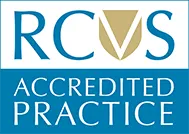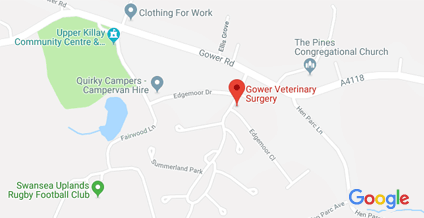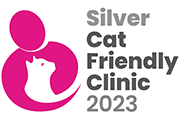We are open for emergenices only 9am-12pm on bank holiday Monday. Please click here to view the latest information on how to access our services.
What is the Practice Standards Scheme?
Overseen by the Royal College of Veterinary Surgeons (RCVS), the Practice Standards Scheme (PSS) is in place to promote and maintain the highest standards of veterinary care through the setting of standards and regular assessments. It is a voluntary initiative in place to accredit veterinary practices in the UK.
RCVS Practice Standards Scheme
As part of the Practice Standards Scheme, small animal veterinary practices can be accredited at one of the following levels:
- core standards
- general practice
- emergency services clinic
- veterinary hospital
Within these standards, there are also additional awards that a practice can apply for to showcase the areas in which they excel.
The following awards are available:
- team and professional responsibility
client service - patient consultation service
- diagnostic service
- in-patient service
- emergency and critical care service
Here at Gower Veterinary Surgery we are RCVS accredited for general practice.
How does it work?
Once a veterinary practice has applied to the scheme, they will undergo an initial assessment, where they will be visited by PSS assessors who are experienced veterinary professionals. They review different areas of the practice such as documentation, facilities, and equipment. They may talk with practice team members, often testing their knowledge as well as talking with clients and observing consultations (with prior permission).
Following the visit, a report is sent to the practice summarising the findings and any advisory actions required. On completion of any actions the practice is awarded the relevant accreditation.
After the initial assessment, practices will be assessed every four years, however, spot check assessments may occur within that period.
What are the benefits of joining the scheme?
As well as ensuring that practices operate to the highest standards within the profession and reassuring clients of the quality of the practice. Being part of the PSS can provide a useful framework in areas such as:
- patient and client protocols
- health and safety
- medicines management
- new staff recruitment and inductions
- staff mental health and wellbeing
- clinical governance and auditing
Gower Veterinary Surgery ensures that following these guidelines and assessments we can help pets live happier and healthier lives.
You can find out more about the Practice Standards Scheme by visiting https://www.rcvs.org.uk/setting-standards/practice-standards-scheme/
Pet Neutering for cats, dogs and rabbits all have significant preventative benefits for your pet's health. You may have a new kitten, puppy, rabbit or even a slightly older pet - regardless neutering can always encourage a healthier and happier lifestyle for your pet.
Your pet is in the best care at Gower Vets. Our top-notch facilities, together with a staff of skilled veterinary surgeons and trained veterinary nurses, guarantee that your dogs receive the finest care possible.
Members of our Pet Health for Life plan can also receive a 10% discount on any pet neutering procedure after first consulting with one of our veterinarians to determine the best timing for your pet.
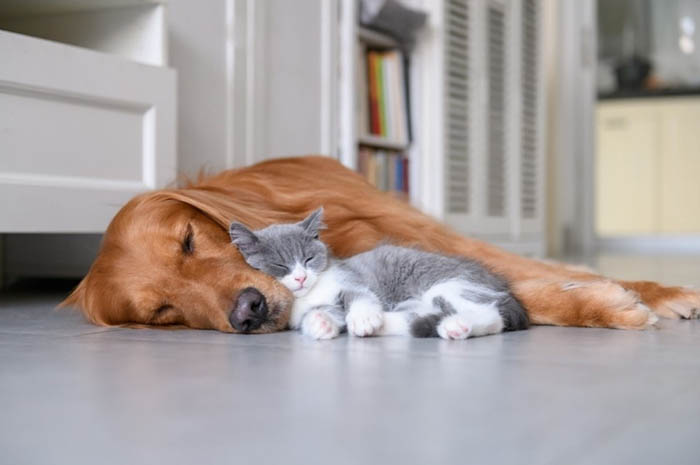
When Can Pet Neutering Take Place?
Cats and Rabbits are both advised from four months old for both males and females. Whereas for dogs, it is advised from six months but the pet's breed, weight and behaviour will also be considered as this can also have an impact. Female dogs can be neutered either pre-season or three months after the season is over.
If you are still unsure then get in touch with us! Our team are always happy to clear things up and advise you.
Pet Neutering Benefits
Beyond only reducing undesired litters, pet neutering has many other advantages. Neutering is essential for protecting our pet's health long-term and well-being in addition to its role in population control. Neutering a pet may have a significant positive effect on their quality of life as well as foster a happier, healthier bond between the animal and the owner. Here are further benefits of pet neutering:
Behavioural Improvements: Unwanted behaviours including hostility, urine marking, wandering, and behaviours connected to mating are frequently reduced after pet neutering.
Longer Lifespan: Pet neutering can have long-term benefits such as your pets living longer. This is thanks to the fact that neutering reduces the risk of reproductive-related health problems that can arise for your pet if neutering does not take place.
Health Benefits: As mentioned before, your pets can be at risk of cancers and infections that come with reproduction. This can include testicular cancer or uterine infections, both can become painful and uncomfortable diseases for your pet. This risk can be avoided through pet neutering.
Pet Management: Overall pet neutering can improve pet management and make it much easier for you, the owner. As they are less distracted by mating instincts, and less likely to look for potential mates which can help decrease the chance of them getting lost, overall makes them easier to handle and manage.
As you can see, pet neutering brings benefits to both you and your pet, to understand more about these points or get an appointment booked, contact us today.
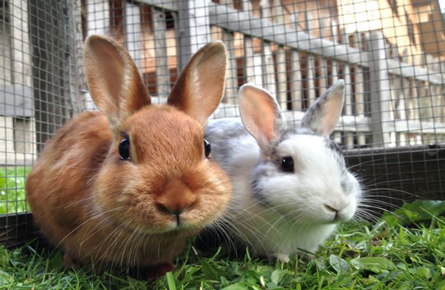
Pet Neutering Frequently Asked Questions
Will neutering affect my pet's behaviour?
As your pet will no longer be mating, a lot of behavioural characteristics that come with it such as hostility, wandering, distraction and marking will all become reduced from the absence of reproduction instincts.
How long does it take for a pet to recover from neutering surgery?
As your pet will go under general anaesthetic, we keep them with us for a day for the best recovery. Once our Vets are happy with their condition, they will then be discharged back to you. However for your pet to have a full recovery, a minimum of 2 weeks depending on the age and gender of your pet is the general time it takes. You can always contact Gower if you are concerned about your pet's recovery after neutering.
How can I prepare my pet for neutering surgery?
When you bring your pet into the practice, please bring them in a secure container with a blanket that smells like home. This will help make them feel more relaxed before the procedure. It may also be beneficial to bring some of their favourite food for the general anaesthetic. The Gower Team are happy to give any further advice if you are unsure of how to prepare.
If you have any further questions about pet neutering that aren’t listed here then please get in touch and our team will be able to advise you.
Book An Appointment With Gower Vets
Contact the Gower Team on 01792 299111 or book a pet neutering appointment here. Take the steps to help both you and your pet in the short and long run. If you still need to understand if pet neutering is for you, please ask a member of our team and we can help advise what is best.
Having a Vet Consultation for your pet will involve an initial consultation to determine whether there are any concerns that need to be addressed. Having this Vet consultation is beneficial whether this is your first time visiting us at Gower Vets or not.
When you register your pet with us for the first time, consultations can be used as a general health and wellness check or to look into any particular illnesses or injuries you may have seen in your pet. We will schedule a consultation for your new kitten or puppy so we can give them a thorough examination before their first microchip.
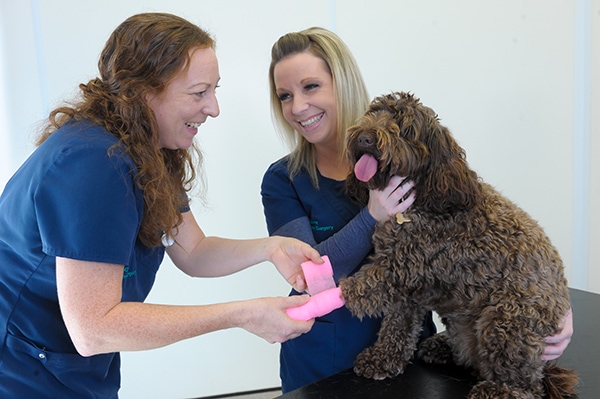
How Do Our Vet Consultation Services Run?
Once you have booked your Vet Consultation with us and brought your pet to our Practice in Swansea. You will then be greeted in a private consultation room by one of our highly skilled and knowledgeable veterinarians or nurses.
Any information you think would be helpful, such as dietary or behavioural changes in your pet, will be requested from you so please have these ready before your consultation. If your pet is already registered with us, we will also go over their past and medical histories. After that, we'll give your pet a comprehensive physical examination, paying close attention to any areas where you might be worried there may be an issue.
Our vets will discuss with you the course of action to take if the initial vet consultation indicates any reason for worry. Medication, x-rays, a nurse clinic referral, or more research might all fall under this category. Every stage of the process will be reported to you to ensure you are kept in the loop.
Our Alternative Consultation Options
Here at Gower Vets, we understand that coming into our practice is not always possible. For these circumstances, we can provide phone and video vet consultation services. One of our highly skilled veterinarians will see you during your call, providing you with the same amount of time and attention to detail as you would in a practice.
We are frequently able to diagnose conditions and, if needed, provide medicine. We may need to physically see your pet if we can't get to a suitable decision over the phone or video. This may happen through an emergency scenario or during a follow-up, in-person that we can schedule for you during the call.

Advantages of Vet Consultations
If you are considering whether booking a vet consultation with us is worth it, here are just a few reasons why they are so important and worth your while:
Professional Advice: Our vets can offer customised, expert guidance for you and your pet based on its particular circumstances.
Preventive Care: Having regular vet consultations can help assist in preserving the health and quality of life of your pet by identifying health problems early and implementing preventive treatments.
Emergency Preparedness: Through Vet consultations, we may be able to notice signs that aren’t clear to you but can prevent future emergencies. By catching signs earlier during consultations we can implement treatment earlier on. We can also offer advice on how to approach potential emergency situations if you are at home.
Monitoring Growth and Development: By coming in for consultations throughout your pet's life, our Vets can keep an eye on your pet's growth and development, making sure they reach developmental milestones and ensuring issues are taken care of straight away.
Peace Of Mind: Having a vet consultation as a pet owner can offer you comfort in knowing that you're taking proactive measures to ensure the health and well-being of your pet.
Book in yours today!
Get started with us at Gower Vets today and book your consultation. Whether you are new or have been with us for a while, book your pet in with us to start utilising our consultation services. Call us on 01792 299111 or contact us here.
Flea Treatment Near Me is for flea and worm infestations in pets, such as dogs and cats. It involves medicines that are used to either prevent or treat flea and worm infestations. In order to keep animals safe from external threats that could seriously injure them, here at Gower Vets, we specialise in giving them the best possible care. For this reason, invest in our reputable veterinary clinic's suitable flea treatment near me service.
The Importance Of Flea Treatment Near Me
Our flea treatment near me service helps to eradicate and deter fleas and worms, tiny parasitic insects that can irritate skin, trigger allergies, and spread illness. There are several ways to treat fleas, including topical applications, oral drugs, and collars. When applied as prescribed, these treatments' chemicals—which are poisonous to fleas—are harmless for pets.
It's critical to administer flea treatment near me and worm treatments on a regular basis to maintain pet health and stop parasites from infecting humans or other animals. Your pet's age, weight, and medical history will determine which flea and worm treatments are best for them, according to our vets here at Gower Vets.
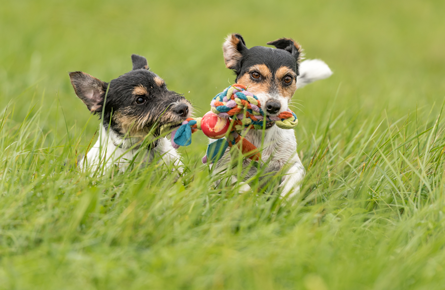
What Flea Treatment Near Me Can Help Prevent
To eradicate and prevent infestations of internal parasites like roundworms, tapeworms, hookworms, and whipworms, our flea treatment near me service here at Gower Vets can help. These parasites can cause weight loss, diarrhoea, anaemia, and other health problems for your pet. If you don't treat fleas and worms, your pet may be at considerable danger for health problems. Several risks associated with flea and worm infestations in pets include:
Skin irritation and allergies: Pets who are bitten by fleas may experience skin irritation, itching, and allergies that result in infection, open sores, and hair loss.
A condition known as anaemia occurs when there are not enough red blood cells in the body to provide the tissues with oxygen. Your pet's blood is the food source for fleas, and a severe infestation might result in anaemia.
Disease transmission: Pets can contract bartonellosis, murine typhus, and tapeworms from fleas.
To keep your pet healthy and stop the spread of parasites to other animals or people, it's critical to frequently check for fleas and worms in addition to receiving flea treatment near me or administering any preventive medicines that your vet may recommend. For guidance on the best course of action if you believe your pet has a flea or worm infestation, get in touch with us here at Gower Vets.
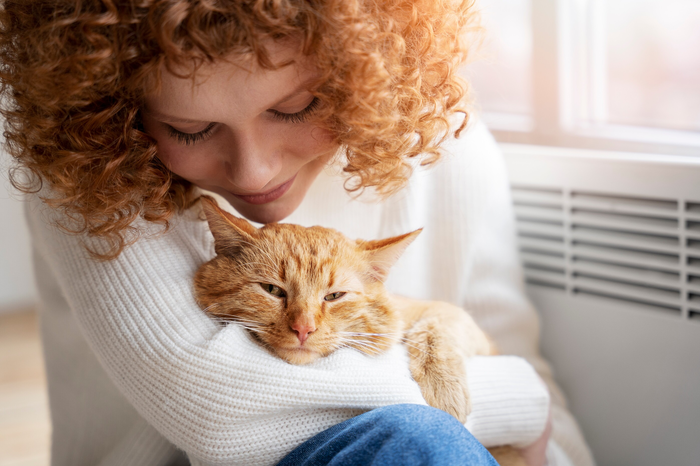
Our Flea Treatment Near Me
Topical flea treatments: These are injected under the skin of the pet, where they kill fleas and stop them from getting into the bloodstream. Revolution, Advantage, and Frontline are a few popular brands.
Oral flea treatments: These therapies prevent fleas from multiplying by being administered orally to the pet. Comfortis, Bravecto, and NexGard are a few popular brands.
Collars for fleas: These collars emit chemicals that kill fleas and stop them from spreading. Seresto and Adams are a couple of popular brands.
The optimal course of action can be recommended by our vets based on your pet's age, weight, and medical history. They can also offer you guidance on how to administer the treatment yourself and address any potential side effects. By consistently applying flea treatment near me, you can maintain the health of your pets and prevent the spread of parasites to humans or other animals.
Book a Flea Treatment Near Me Today
Contact our specialist team at Gower Vets on 01792 299111 or book an appointment to protect your pet with our Flea Treatment Near Me Service.
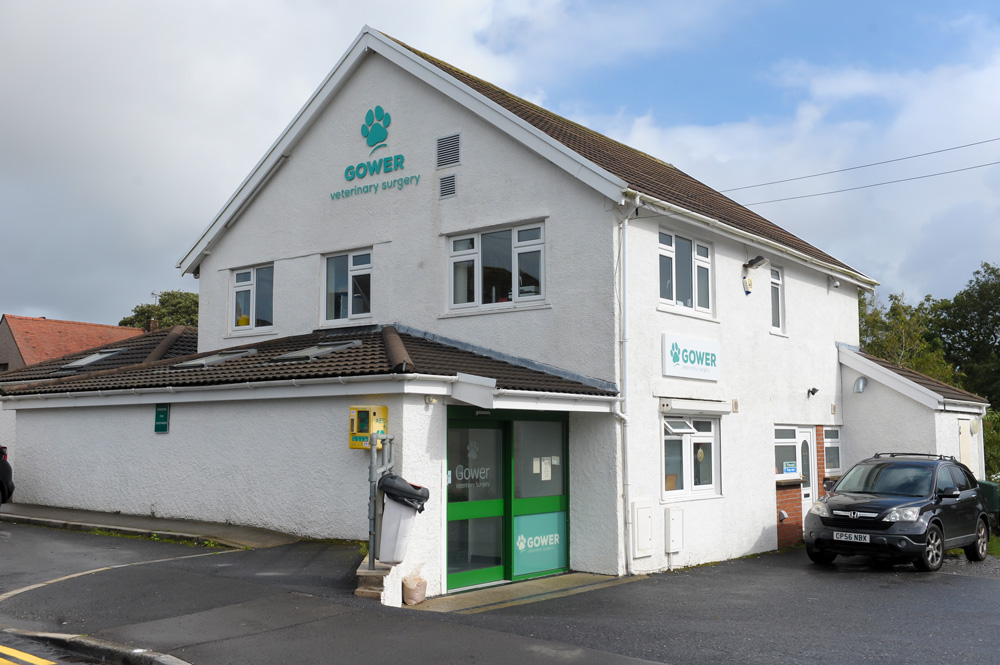
Lost and found pets in Swansea
What to do and how you can help a lost or found pet
Losing or finding a pet can be a concerning or upsetting time. At Gower Vets, we're not just about caring for your pets but also supporting our local community of pet lovers in Swansea. One of the most distressing experiences for a pet owner is losing or coming across a lost pet in need. This is why our team have put together a guide to support you through what to do if you've lost your pet, how to help if you've found a lost pet, and steps you can take to prevent such situations in the first place.
Lost your pet? Here's a step-by-step plan
Losing your pet is a heart-wrenching experience, but there are steps you can take to increase the chances of a reunion:
- Stay calm: Your pet may be frightened, so remaining calm is vital. Search your immediate area, calling their name.
- Notify local authorities: Contact your local animal shelters and vets. Provide them with a detailed description of your pet, including any distinctive marks or features.
- Create flyers: Distribute flyers with your pet's photo, contact information, and their last-known location. Post them in and around your local area, pet stores, and online community groups.
- Use social media: Share your pet's information on local social media platforms, including local lost-and-found pet groups. This can significantly expand your search radius.
- Visit local shelters: Visit nearby animal shelters and rescues regularly. Sometimes, lost and found pets are brought to these facilities
- Don't give up: Keep searching, and don't lose hope. Lost pets can often find their way home, even after a few days or weeks.
- Tip when finding your lost pet: Greeting your pet positively when they return is an important part of behaviour training.
Follow us on Facebook to stay updated with Gower Vets
Lost your pet in Swansea? Know who to contact!
In Swansea, and more broadly across the UK, several specific organisations can assist you with lost and found pets:
- Contact your local council: They often handle lost pets in your area.
- RSPCA (Royal Society for the Prevention of Cruelty to Animals): The RSPCA may be able to help if you've found an injured pet.
- Use online databases: Websites like "Pets Located" can help reunite lost pets with their owners.
Found a lost pet? Here's How you can help!
What to do if you find a stray animal
Dogs:
The relevant Local Authority (dog warden) is responsible for all stray or abandoned dogs. You can find the relevant guidance here.
Cats:
Distinguishing between a stray cat and a feral one can pose a significant challenge. Feral cats reside outdoors, far from human contact, and remain undomesticated. A stray cat may look skinny or underweight, they are usually timid and shy and may come to you in time, whereas a feral cat is most likely to avoid coming up to you as hey tend to live in colonies. Typically, a stray cat will be found roaming around houses and people and even in your garden.
In the event of encountering a stray cat, your initial step should be to try and locate its owner. You can provide the cat with shelter and nourishment while making efforts to find its owner, but it is essential to have the cat checked for a microchip and search for lost and found listings online beforehand.
Stray cats can be brought to your local animal shelter or veterinary clinic for a microchip scan to retrieve information about their owner.
If you're worried about a stray cat's health, contact the following on their emergency numbers:
- RSPCA (England and Wales) 0300 1234 999
- USPCA (Northern Ireland) 028 3025 1000
- Scottish SCPA (Scotland) 03000 999 999
Identifying a lost pet in Swansea
Discovering a lost pet on the street in Swansea can be both concerning and challenging. Here are some steps to safely identify and assist a pet in need, along with a crucial warning about approaching unfamiliar animals:
- Approach cautiously: First and foremost, approach the animal with extreme caution. Keep in mind that the pet may be frightened, disoriented, or possibly injured. Make slow, non-threatening movements, and avoid sudden gestures or loud noises.
- Observe their behaviour: Before attempting to get closer, observe the pet's behaviour from a safe distance. If the animal appears aggressive, extremely fearful, or demonstrates any signs of illness or injury, it's crucial to prioritise your safety and not approach further.
- Check for identification: Carefully check for any visible identification, such as tags on a collar. If the pet is wearing a collar, take note of any contact information. However, be aware that unfamiliar animals may react unpredictably, so take great care when trying to examine their collar.
- Offer food and water: If the animal seems approachable and doesn't show aggressive behaviour, you can offer food and water to help gain their trust. Approach slowly and place the offerings near them without making any sudden movements. Keep in mind that a frightened pet may not immediately accept food or water.
- Call for assistance: If you can safely approach the animal and identify an address or phone number on their collar, contact the owner if possible. If the pet appears lost or in distress and you feel comfortable handling them, you can try to keep the pet safe until assistance arrives.
- Alert local authorities: If you are unable to approach the pet safely or the animal is clearly injured or in distress, contact your local council or animal rescue centre.
- Offer temporary care: If you feel comfortable with the pet, provide them with food, water, and shelter while searching for the owner. Ensure the pet is secure and safe.
- Never assume safety: While helping a lost pet can be a compassionate act, it's crucial to prioritise your safety and the safety of others. Unfamiliar animals, especially when scared or injured, may behave unpredictably. Approach with caution and avoid putting yourself at risk.
- Report a lost or found pet: Use tools such as Animal Search UK, and local groups and pages on social media to spread the word about a lost pet.
- Get their microchip scanned: Your local vet or animal shelter should be able to check the lost pet for a microchip, which they can scan to help identify and then contact the owner. This is why it’s important to microchip your pet and ensure their microchip details are up to date.
Remember that the safety of both the lost pet and the person who finds them is paramount. In some cases, it's best to let trained professionals handle the situation. Always exercise good judgment when assisting a pet on the street to ensure the well-being of all involved.
Preventative steps to avoid losing your pet
Here at Gower Vets, our team have put together a list of our best tips for precautions you can take to help avoid losing your pets:
- Secure your garden: Ensure your garden or outdoor areas are escape-proof for dogs. Similarly, you should also regularly check for weak spots in your fences or gates. Consider whether your dog could get over, or even dig their way under.
- Securing your home for indoor cats: If you have an indoor cat, ensure that the doors and windows are always closed to avoid them escaping.
- Microchip your pet: Microchipping is a permanent form of identification. Ensure your contact information is up to date with the microchip provider. It is a legal requirement in England for both cats and dogs to have valid and up-to-date microchips to identify them if they ever become lost and found.
- Use appropriate collars and tags: Make sure your pet wears a collar with an ID tag containing up-to-date contact information. Additionally, quick-release collars are recommended for cats to reduce risk of injury if the collar gets caught on something whilst they are exploring.
- Training and recall commands: Teach your pet recall commands to ensure they come when called if you want to enjoy time together outdoors without their lead.
- Leash and supervise: Unless you are confident in your dog’s recall ability, you should always leash your dog when outside and supervise them, especially in unfamiliar areas.
- Consider having them spayed or castrated: Having your pet neutered reduces the urge to roam and can prevent them from getting lost in the process.
Microchipping your cat is now a legal requirement in England: If you are a cat owner in England, you will be legally required to ensure your cat is microchipped by Saturday 10 June 2024, if it is older than 20 weeks old.
See our preventative care services
How to make your pet more identifiable
By making your pet more identifiable, you increase your chances of a successful reunion. Lost and found pets without any form of identification can often be overlooked as stray pets, so it’s crucial to ensure that they have clear and up-to-date contact information on them. At Gower Vets, our best recommendations on how you can make your pet more easily trackable and identifiable include:
- keeping a clear and up-to-date photo of your pet, which shows any unusual coat markings or features that are recognisable to your pet
- using a GPS collar for real-time tracking
- considering a reflective or glow-in-the-dark collar for night-time visibility
- considering colourful or unique collars and accessories for your pet - An animal in a rainbow collar or sparkly pink bandana is a lot more easily identified than one simply wearing a plain collar or none at all.
Contact Gower Vets in Swansea if you have a lost or found pet today
In times of lost and found pets, the pet-loving community can make a significant difference. By following the suggested steps and taking preventative measures, you can help reunite lost pets with their families and safeguard your own pets from similar ordeals. Together, we can create a safer and more compassionate environment for our beloved companions.
If you have any further questions or concerns, or believe that you have a lost and found pet, please contact Gower Vets today.
Our team may be able to offer advice and support in either finding your missing pet or caring for a lost or found pet.
Contact us on 01792 299111
Page 1 of 8
-
Veterinary Surgeon
Location: 68-31 Edgemoor Close, Upper Killay, SwanseaHours: Full timePractice: Gower Veterinary SurgerySalary: £60,000 per annum, £4,000 welcome bonus, Salary up to and dependent on experienceRead more


